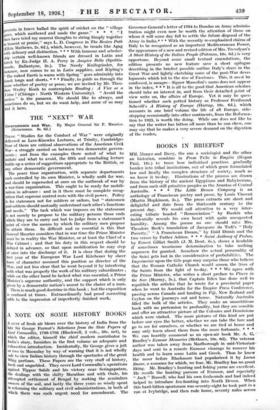THE "NEXT" WAR
Governments and• War. By Major General Sir F. Maurice. (Heinemann. 8s. 6d.)
THESE " Studies for the Conduct of War " were originally delivered as Lees-Knowles Lectures, at Trinity, Cambridge. Four of them are critical observations of the American Civil 1Var—a struggle carried on between two democratic govern- ments ; and from the examples there noted ' of what to imitate and what to avoid, the fifth and concluding lecture builds up a series of suggestions appropriate to the British, or any other democratic government.
The peace time organization, with separate departments each controlled by its own Minister, is wholly unfit for war, and should be superseded at once on the outbreak of war by a war-time organization. This ought to be ready for mobili- zation in advance : and in it there must be complete recog- nition that supreme control rests with the civil power. Policy is for statesmen not for soldiers or sailors, but " statesmen and soldiers should mutually understand each other's functions and needs." The task which war imposes on the statesman is not merely to propose to the military persons those ends which they are to carry out but to judge from a statesman's point of view the means by which the military men propose to attain them. So difficult and so essential is this that General Maurice considers that in war time the Prime Minister must be in reality the War Minister, or at least the Chief of a War Cabinet : and that his duty in this respect should be defined in advance, so that upon mobilization he may step at once into the discharge of it. It is clear that during the first year of the European: War Lord Kitchener by sheer force of character assumed this position as director of the War, and not less clear that he went beyond it by interfering with what was properly the work of his military subordinates while on the other hand he lacked what was essential, a Prime Minister's supreme authority, and the support which is only given by a democratic nation's assent to the choice of a man. There is much good doctrine in this book ; but the exposition is confused at times. Extraordinarily bad proof correcting adds to the impression of imperfectly finished work.






























































 Previous page
Previous page